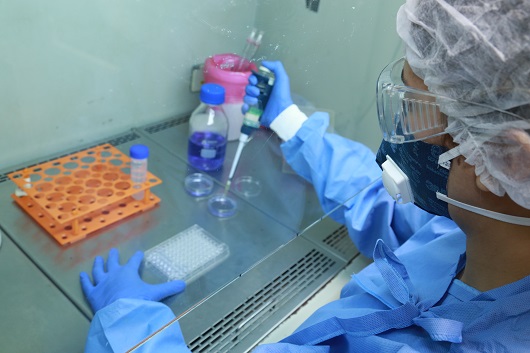Drugs against hepatitis C inhibit the replication of the new coronavirus
29/06/2020
Maíra Menezes (IOC/Fiocruz)
A study led by the Oswaldo Cruz Foundation (Fiocruz) has observed that drugs currently used to treat hepatitis C inhibit the replication of the new coronavirus (SARS-CoV-2) in experiments made with cells. The experiments have identified, in particular, the potential of an antiviral drug, daclastavir, which was able to work against the virus in three different cell lineages under investigation, in addition to reducing the production of inflammatory substances associated to severe cases of Covid-19. Considering the relevance of the fast sharing of scientific evidence in the context of this pandemic, the findings were published in the pre-print website bioRxiv.

The action of the antiviral daclastavir against the new coronavirus was observed in human lung and liver cell lines, in addition to Vero cells (photo: IOC / Fiocruz)
The work was led by the Center for Technological Development in Health (CDTS/Fiocruz), in a partnership with the Oswaldo Cruz Institute (IOC/Fiocruz), with the participation of IOC Laboratories of Immunopharmacology and Research on Thymus. Other collaborators were the Evandro Chagas National Institute of Infectious Diseases (INI/Fiocruz), Universidade Iguaçu (Unig), Instituto D’Or de Pesquisa e Ensino (D’Or Institute of Research and Teaching - Idor), National Institute of Science and Technology in Innovation of Diseases in Neglected Populations (INCT-IDNP), and National Institute of Science and Technology in Neuroimmunomodulation (INCT-NIM).
The CDTS researcher and principal investigator of the study, Thiago Moreno, highlights the importance of identifying compounds that act against the new coronavirus among drugs clinically approved against other diseases. “The repurposing of drugs is acknowledged by the World Health Organization (WHO) as the fasts way to identify candidates to treat Covid-19. Considering that antiviral drugs with direct action against the hepatitis C virus are some of the safest ones available, our results show that these drugs, daclastavir in particular, are good candidates for therapy against Covid-19, with potential to be immediately incorporated in clinical trials”, states Moreno.
“While quarantine and physical distancing aim to reduce disease transmission, it is to be expected that the early administration of antivirals improves the clinical situation of infected patients, reducing the occurrence of severe cases. For this reason, it is crucial to find safe and effective compounds that can be evaluated in clinical trials”, emphasizes the chief of the IOC/Fiocruz Immunopharmacology Laboratory and author of the article, Patrícia Bozza. Also recently, scientists have focused on the potential of action of atazanavir, a drug normally used in anti-HIV therapy, against the new coronavirus.
The authors also warn against the risks of self-medication, emphasizing that tests on patients are fundamental to assess the efficacy of treatments and all people with suspected or confirmed cases of Covid-19 should seek medical care for orientation regarding the suitable therapy.
Test results:
The research assessed the antiviral drugs daclastavir and sofosbuvir. They inhibit the replication of the hepatitis C virus through different mechanisms. In tests with the new coronavirus, daclastavir prevented the production of infective viral particles in three cell lineages under study, including human lung cells. The analysis showed that the drug interrupted the synthesis of viral genetic material, which stopped virus replication. In infected defense cells, the drug also reduced the production of inflammatory substances, which are associated to hyperinflammation observed in severe cases of Covid-19.
The action of daclastavir against the new coronavirus was more powerful than that of sofosbuvir. Sofosbuvir inhibited viral replication in lineages of human lung and liver cells, but did not have any effect during infection on Vero cells, derived from monkey kidneys and largely used in virology studies. The trials also compared their action to the effects of other drugs. Daclastavir was from 1.1 to 4 times more efficient than chloroquine and than the combination of lopinavir and ritonavir, drugs being studied in clinical trials for the treatment of Covid-19 - as well as ribavirin, a wide-spectrum antiviral drug used to treat hepatitis. Daclastavir was also more effective than atazanavir, previously tested by the scientists.
The authors of the paper also point out that the pharmacological parameters of daclastavir against the new coronavirus have proven to be compatible with the pharmacokynetis of the drug in patients, which strengthens its potential for clinical trials. “These results strongly suggest that daclastavir, due to its anti-SARS-CoV-2 and anti-inflammatory effects, may bring benefits to Covid-19 patients”, states Moreno.


